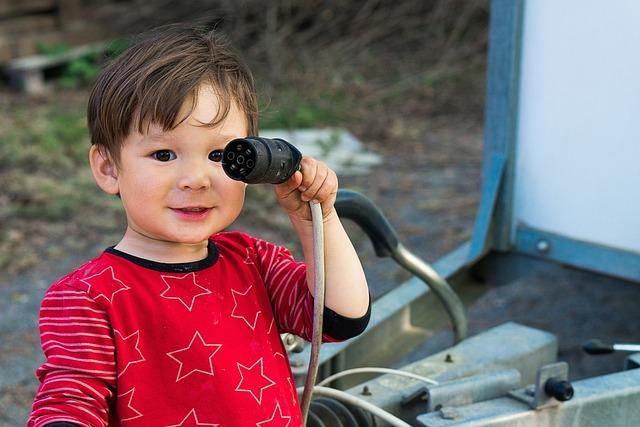Every morning, Sarah’s golden retriever, Max, greeted her with wagging tails and playful barks. But lately, his joyful antics turned into chaos—chewing shoes, barking at shadows, and ignoring commands. Concerned, Sarah sought answers. She discovered that changes in routine, stress, or even boredom could trigger such behavior. Understanding the root of Max’s mischief was crucial. By addressing his needs and providing structure, Sarah could restore harmony. If your dog is misbehaving, consider what might be affecting their world. Your furry friend may just be trying to tell you something!
Contents
- Understanding the Root Causes of Increased Canine Misbehavior
- Identifying Environmental Factors That Influence Your Dogs Behavior
- The Importance of Consistent Training and Socialization Practices
- Implementing Effective Solutions to Restore Harmony in Your Home
- Q&A
Understanding the Root Causes of Increased Canine Misbehavior
To effectively address your dog’s misbehavior, it’s essential to delve into the underlying factors that may be contributing to this change in behavior. Various elements in a dog’s environment and routine can significantly influence their actions. Understanding these root causes can help you implement effective strategies to restore harmony in your home.
One of the primary reasons for increased misbehavior can be attributed to **changes in routine**. Dogs thrive on consistency, and any disruption—such as a new work schedule, moving to a new home, or the arrival of a new family member—can lead to anxiety and confusion. This stress may manifest as destructive behavior, excessive barking, or even aggression. Recognizing and addressing these changes can help mitigate their impact on your dog’s behavior.
Another critical factor to consider is **insufficient physical and mental stimulation**. Dogs require regular exercise and mental engagement to stay happy and well-adjusted. A lack of activity can lead to boredom, which often results in mischief as they seek ways to entertain themselves. Incorporating daily walks, interactive toys, and training sessions can significantly reduce unwanted behaviors by channeling their energy into positive outlets.
Lastly, it’s important to evaluate your dog’s **health and well-being**. Physical discomfort or illness can lead to behavioral changes that may be mistaken for misbehavior. Conditions such as allergies, dental issues, or even anxiety disorders can cause dogs to act out. Regular veterinary check-ups and being attentive to any signs of distress can help identify and address health-related issues before they escalate into more serious behavioral problems.
Identifying Environmental Factors That Influence Your Dogs Behavior
Understanding the environmental factors that can affect your dog’s behavior is crucial in addressing any misbehavior. Dogs are highly sensitive to their surroundings, and various elements can trigger stress or anxiety, leading to undesirable actions. For instance, changes in the household, such as moving to a new home or the arrival of a new family member, can create a sense of instability for your pet. This disruption can manifest in behaviors like excessive barking, chewing, or even aggression.
Another significant factor to consider is the dog’s exposure to different stimuli. Loud noises, such as thunderstorms or fireworks, can cause fear and anxiety in many dogs. Similarly, the presence of unfamiliar animals or people can lead to defensive or aggressive behavior. It’s essential to observe how your dog reacts to these stimuli and to create a safe space where they can retreat when feeling overwhelmed. **Identifying these triggers** is the first step in helping your dog cope with their environment.
Additionally, the physical environment plays a vital role in your dog’s behavior. A cluttered or chaotic living space can lead to stress, while a well-organized and calm environment can promote relaxation. Ensure that your dog has a designated area that is free from distractions and provides comfort. **Factors such as lighting, noise levels, and even the presence of other pets** can significantly impact your dog’s mood and behavior. By optimizing their surroundings, you can help mitigate some of the misbehavior you may be witnessing.
Lastly, socialization is a key component in shaping a dog’s behavior. Dogs that lack proper socialization may exhibit fear or aggression towards new experiences or individuals. Regular exposure to different environments, people, and other animals can help your dog develop confidence and adaptability. **Consider enrolling your dog in training classes or arranging playdates** with other dogs to enhance their social skills. By addressing these environmental factors, you can foster a more balanced and well-behaved companion.
The Importance of Consistent Training and Socialization Practices
One of the most crucial aspects of a well-behaved dog is the establishment of consistent training and socialization practices. Dogs thrive on routine and clear expectations, which help them understand what behaviors are acceptable and which are not. When training is sporadic or inconsistent, it can lead to confusion and anxiety in your pet, resulting in misbehavior. By implementing a structured training regimen, you not only reinforce good behavior but also build a stronger bond with your furry friend.
Socialization plays an equally important role in your dog’s development. Exposing your dog to various environments, people, and other animals helps them become well-adjusted and confident. Without proper socialization, dogs may react negatively to new experiences, leading to fear-based behaviors such as barking, aggression, or withdrawal. Regularly introducing your dog to different situations can significantly reduce the likelihood of these issues arising, ensuring they are comfortable and relaxed in diverse settings.
Consistency in training and socialization also aids in establishing clear communication between you and your dog. When commands and cues are consistently reinforced, your dog learns to respond appropriately, reducing the chances of misunderstandings. This clarity not only helps in curbing unwanted behaviors but also enhances your dog’s overall responsiveness to commands. A well-trained dog is a happy dog, and a happy dog is less likely to engage in misbehavior.
Moreover, the benefits of consistent training and socialization extend beyond just behavior correction. They contribute to your dog’s mental stimulation and emotional well-being. Engaging your dog in regular training sessions and social activities keeps their mind active and helps prevent boredom, which is often a precursor to destructive behaviors. By prioritizing these practices, you are investing in a healthier, happier, and more balanced life for your canine companion.
Implementing Effective Solutions to Restore Harmony in Your Home
Understanding the root causes of your dog’s misbehavior is crucial in restoring peace within your home. Often, behavioral issues stem from factors such as **stress**, **boredom**, or **lack of exercise**. By identifying these triggers, you can implement tailored solutions that address your dog’s specific needs. For instance, if your dog is exhibiting signs of anxiety, consider creating a safe space where they can retreat when feeling overwhelmed. This sanctuary can be equipped with their favorite toys and blankets, providing comfort and security.
Another effective approach is to enhance your dog’s daily routine. Dogs thrive on structure and predictability, so establishing a consistent schedule for feeding, walks, and playtime can significantly reduce misbehavior. Incorporate **interactive toys** and **training exercises** into their day to keep their minds engaged. This not only combats boredom but also strengthens your bond through positive reinforcement. Remember, a well-exercised dog is a happy dog, so aim for at least 30 minutes of physical activity each day.
Socialization plays a vital role in a dog’s behavior. If your dog is not exposed to various environments, people, and other animals, they may react negatively when faced with new experiences. Gradually introduce your dog to different settings, ensuring each encounter is positive. Consider enrolling them in a training class or arranging playdates with other dogs. This not only helps in reducing anxiety but also teaches your dog how to interact appropriately with others, fostering a sense of confidence.
Lastly, don’t underestimate the power of professional guidance. If your dog’s misbehavior persists despite your best efforts, consulting a certified dog trainer or a veterinary behaviorist can provide valuable insights. These professionals can assess your dog’s behavior and recommend personalized strategies tailored to your situation. Investing in expert advice can lead to lasting changes, ensuring a harmonious environment for both you and your furry friend.
Q&A
-
Is my dog experiencing anxiety or stress?
Yes, changes in environment, routine, or family dynamics can lead to increased anxiety in dogs. Signs of stress may include excessive barking, destructive behavior, or withdrawal. Addressing these issues promptly can help restore your dog’s sense of security.
-
Could my dog be bored or under-stimulated?
Absolutely. Dogs require mental and physical stimulation to stay happy and healthy. If your dog is misbehaving, it might be a sign that they need more exercise or engaging activities. Consider incorporating daily walks, playtime, and puzzle toys into their routine.
-
Is my dog reacting to changes in my behavior?
Yes, dogs are highly attuned to their owners’ emotions and behaviors. If you are stressed, busy, or distracted, your dog may misbehave as a way to seek attention or express their own discomfort. Maintaining a consistent routine and providing reassurance can help mitigate this behavior.
-
Could there be a health issue affecting my dog’s behavior?
Definitely. Changes in behavior can sometimes indicate underlying health problems. If your dog’s misbehavior is sudden or severe, it’s crucial to consult your veterinarian to rule out any medical issues that could be causing discomfort or pain.
understanding your dog’s misbehavior is crucial for fostering a harmonious relationship. By identifying underlying causes and addressing them with patience and care, you can guide your furry friend back to good behavior and strengthen your bond.

大家好,我是彼得潘,專業的手法身體治療師。我喜歡探索和研究各種主題,並透過與人工智慧的合作分享專業、實用、有趣的文章。我們定期進行人工審核,以確保內容的準確性。如果您發現文章中有任何不準確的地方,請隨時與我們聯繫,我們會及時糾正。您可以透過 [email protected] 與我們聯繫。



